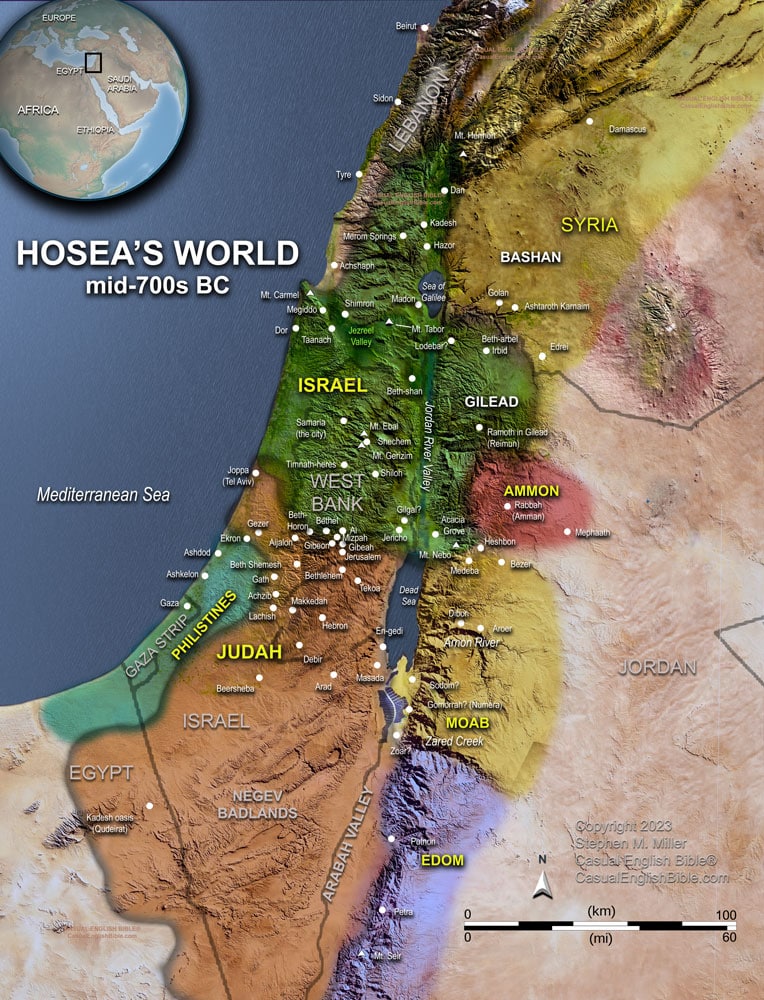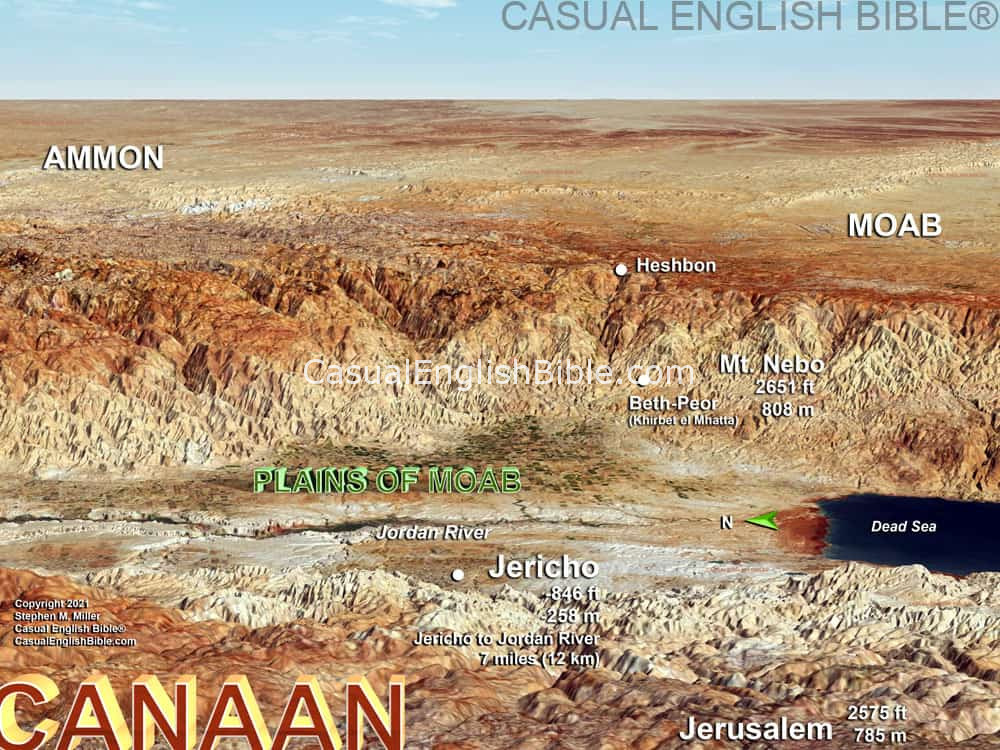Hosea 9
Israel sentenced to death
Hookers at harvest
1Don’t celebrate the harvest [1] this year, Israel.Don’t throw a party like other nations do.
You got this harvest through prostitution,
Which you committed by betraying God. [2]
You love all that grain on the threshing floor, [3]
The fee you received as a hooker. [4]
2The grain and the wine won’t feed you.
The grape harvest will fail.
3Israel needs to get off the LORD’s land.
Ephraim [5] is headed back to a place like Egypt. [6]
And you’ll eat non-kosher [7] food in Assyria.
4You won’t pour out wine
In offerings to the LORD.
You won’t sacrifice anything again. [8]
You’ll eat non-kosher bread
As unclean as food at a funeral. [9]
Anyone eating it becomes unclean.
Though it’s food fit for humans,
It’s not fit for the Temple of the LORD.
5So, what will you do on holy holidays
To celebrate festivals of the LORD?
6Even if they survive the destructive battles.
“Egypt” [10] will capture them.
“Memphis” will bury them.
Weeds will inherit their silver treasures.
Thorns will move into their tents.
Time to pay for the crime
7Now’s the time to face your punishment.Today’s the day you pay the price.
Israel reacts by screaming,
“The prophet’s an idiot.
This spirit guy’s crazy.”
You’ve got a lot of anger
Because you’ve got a lot of guilt.
8Who’s the prophet here?
Ephraim, are you God’s lookout person? [11]
You’re not even allowed in God’s house.
And wherever you go, traps are waiting.
9You’ve gone too far,
Like they did in Gibeah. [12]
God remembers the sin.
And he punishes it, too.
God saw something special in Israel
10What I saw in Israel was rare,Like finding a string of grapes in the badlands,
Or a tiny fig early in the season. [13]
But when they came to Baal of Peor [14]
They fell in love with something shameful,
And became as shameful as what they loved.
11Israel’s glory flew away like a bird.
No births to brag about,
No one pregnant or getting there.
12Even if they somehow raise some kids
I’ll take those kids away.
It’ll be a bad day for Israel
When I leave them behind.
Siege of Israel
13Like the siege of beautiful Tyre,There’ll be a siege in Ephraim, too.
Then parents will lead their children
Outside the walls, to the slaughter.
14Lord, give Ephraim this.
I don’t know—what should you give them?
Miscarriages and dried up boobs.
15Every bad thing they ever did
Started in the town of Gilgal, [15]
First town they reached in the land.
For the evil they did,
I’ll run them out of my house.
I’m done showing love to leaders like this,
Who show nothing but betrayal in return.
16Ephraim is beaten down flat
And dead to the root.
There won’t be any more fruit.
If by chance some children are born
I’ll kill those children they love.
17They didn’t listen.
And wandered from God.
Now they’ll wander the world as refugees,
As people with no land of their own.
Footnotes
The text doesn’t say the celebration is about the harvest. But context of the verses that follow suggests the kind of annual celebration farmers have at harvesttime—which is payday for them. It’s a natural time to celebrate a good harvest.
Presumably, they worshiped God by merely going through the rituals. And they may have worshiped Baal as another God. Also, they likely worshiped at a variety of shrines and hilltop altars, when the only acceptable place for a Jew to worship God was at the Jerusalem Temple (Deuteronomy 12:5).
The threshing floor is where farmers separate the grain kernels from the stalks. They pulled heavy sleds over the stalks and threw them in the air to let the wind blow away the light straw and chaff. The heavy kernels fell back to the floor.
In what appears to read as a metaphor, Jewish farmers are the prostitutes and the grain is the fee they collect for prostituting themselves—which is what they did to get this harvest. They worshiped Baal, the local god of fertility in family, flock, and field. If you wanted kids, more livestock, and a good harvest, local non-Jews said Baal was the go-to god.
“Ephraim” is another name for the Northern Jewish nation of Israel. It was the dominate tribe, and the last to fall to Assyrian encroachment. The first northern king came from Ephraim. It’s a tribe located at the center of what had been the united nation of Israel before the split. Ephraim’s southern border was just half a day’s walk north of Jerusalem.
Not literally Egypt, but figuratively. Just as the Jews were once slaves in Egypt, they’ll be slaves in Assyria.
See Leviticus 11 for a list of food the Israelites (and today’s observant Jews) could and couldn’t eat. No lobster, softshell crab, or steaks cooked rare. But they could pig out on baked grasshoppers, fried locusts, and wild honey. No pig, though.
They will be about 1,000 miles (1,600 km) from the Jerusalem Temple, the only place Jews were allowed to sacrifice to God.
People become ritually unclean when they come into contact with the dead. And anything they touch becomes unclean as well. An unclean person had to bathe, wash the clothes, and wait until evening to return to ritual cleanliness. Then it would be safe to touch others or offer sacrifices to God.
Not literally “Egypt” or “Memphis.” It was Assyria that conquered Israel. Egypt is a powerfully symbolic way of saying they are going to lose everything, as though going back to square one, where they started: slaves. Burial at Memphis might have symbolized a lot of dead people and dead leaders because Memphis had a huge cemetery along with pyramid tombs for royalty.
Literally a “watchman,” a lookout guard on a tower or stationed on the perimeter of a city or a kingdom. The job was to warn people of danger coming.
Israelites in Gibeah gang-raped and murdered a Levite’s concubine. Attempts to arrest the criminals ended in a civil war that nearly annihilated the tribe of Benjamin (Judges, chapters 19-21).
This would be around May or June. Figs are harvested late in the summer: August and September.
Peor was a mountain somewhere in Moab, location uncertain. People there worshiped Baal, the main Canaanite god. Baal of Peor was apparently a local representation of him. When women from Moab seduced some of the Israelite men to engage in either ritual sex or just plain ol’ illicit sex, it led the men into idolatry (Numbers 25). Baal was considered a god of fertility in family, flocks, and fields. Some scholars say the idea behind one worship ritual was to entertain Baal by letting him watch people have sex. They did this so he would make it rain. It’s a tad gross, but some taught that the rain was Baal’s semen. So, if the sex of worshipers got Baal stimulated enough, he would make it rain in this predominately dry part of the world.
Gilgal’s exact location is unknown, but it was near Jericho on the Promised Land’s side of the Jordan River. It was the first town they reached when they crossed into the land God gave them—land where Israelis and Palestinians live today. Gilgal was an ancient religious site before the Israelite ancestors of today’s Jews got there. Hosea and Amos both criticized the city (Hosea 4:15; 12:11; Amos 4:4; 5:5). That suggests it was a place of worship that God didn’t appreciate. Jews may have worshiped God there, instead of in Jerusalem. Or they may have worshiped some other god.
Discussion Questions
- Sorry, there are currently no questions for this chapter.











